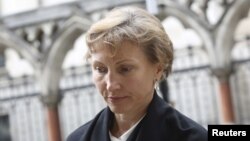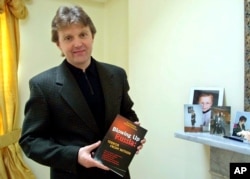A lawyer for the widow of Alexander Litvinenko insisted on Friday that the former KGB agent was murdered at the behest of Russian President Vladimir Putin, and said Russian authorities have repeatedly tried to obstruct an inquiry into the death.
Ben Emmerson said Moscow has attempted "to frustrate and manipulate'' the investigation by refusing to cooperate and raising objections and obstacles.
Litvinenko, who fled to London in 2000 and became a fierce critic of Putin, died in 2006 after drinking tea laced with radioactive polonium-210 at a London hotel. On his deathbed, he accused Putin of ordering his assassination — a claim Moscow denies.
British police have accused two Russians, Dmitry Kovtun and Andrei Lugovoi, of carrying out the killing, sponsored by elements in the Kremlin. Both deny involvement, and Moscow refuses to extradite them.
Emmerson said Litvinenko "had been identified as an enemy of state who had to be liquidated'' because he was going to expose links between Putin and organized crime.
The killing soured relations between London and Moscow, and they have since deteriorated further as the West imposes economic sanctions on Russia over violence in eastern Ukraine.
Secret intelligence evidence
An inquest into Litvenenko's death stalled for years because British authorities were unwilling to disclose secret intelligence evidence. Last year, the government announced a judge-led public inquiry, which opened in January.
The inquiry head, judge Robert Owen, has seen the secret evidence, though lawyers, media and the public have not.
On the final day of hearings at London's Royal Courts of Justice, Emmerson said the public evidence proved the guilt of Kovtun and Logovoi "beyond reasonable doubt,'' and showed they were directed by Kremlin elements answering to Putin, a "tin-pot despot, a morally deranged authoritarian.''
Owen plans to release his conclusions by the end of the year.

